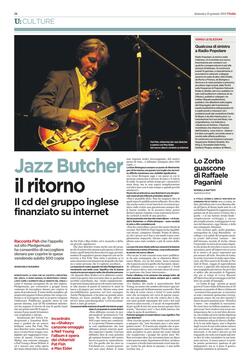
The Jazz Butcher
Press
Jazz Butcher
- January 13, 2013
Published: l'Unità
(Italy)
January 13, 2013
Credit:
;;
Source:
archive.org
Interview w/Conspirator:
Pat Fish
Item added: 2024-11-14
il ritorno
Il cd del gruppo inglese finanziato su internet
CAUTION - This is a robotic translation of the original Italian publication
Fish says that the appeal on the Pledgemusic website allowed them to raise money to cover expenses by immediately selling 500 copies GIANCARLO SUSANNA DESPITE THE CRISIS THAT HAS HIT THE RECORD INDUSTRY, THERE ARE CONSOLING SIGNS OF RESISTANCE SUCH AS THE INCREASE IN VINYL SALES OR like the system devised by an English website, Pledgemusic, to allow bands without a contract to raise money to cover production costs. It's all very simple: buyers pay for the record before it is produced and if the project doesn't come to fruition they are reimbursed. Published a few months ago with this system, Last Of The Gentleman Adventurers marked the return of one of those bands that in the early 80s frequented British post-punk with originality and talent. In love with the Velvet Underground and Jonathan Richman and led by a brilliant author like Pat Fish, The Jazz Butcher (a «jazz butcher») were perhaps too «unkempt» to achieve mass success. Centered on Shakey, a song in homage to Neil Young and Brian Wilson, the CD is once again the work of the guitar team formed by Pat Fish and Max Eider, and it is, needless to say, a small masterpiece. The Jazz Butcher were also one of the groups that the undersigned played most often on Stereonotte and that friendship still lasts today, allowing us to report this feat to you with an interview with Pat Fish. Not all is lost if there are musicians so in love with what they do and so many people who want to listen to them. The response to your appeal on the Pledgemusic site is truly a beautiful thing. It means that good music still has a place in many people’s lives. “Yes. When Max (Eider) and I started the project we had no idea if anyone would contribute, but - very quickly people showed that they were interested in the music to the point of putting their hands in their pockets and paying for it. Some were incredibly generous in their support. Pledgemusic has also been a big help. They have a good business model for a “post-record company” era and I would recommend them to all artists.” What do you think about the reaction of those who bought the CD when you finished it? “We didn’t try to “promote” the album in any way. We pressed 500 copies to start with. People bought it so quickly that we couldn’t keep any copies for the media. So we have no idea what the opinion-formers think of our work (other than you, of course!). From what I’ve seen on Facebook etc, our supporters are not disappointed. It’s been a very encouraging response, from our point of view... and we’ve printed another 500 copies...». Britain is always a reference point for people in music, but that doesn’t mean it doesn’t make it very difficult to maintain significant visibility. «Britain today is a country where people know the price of everything and the value of nothing. It’s been hard for musicians lately, but I just don’t know what else to do with my time so why stop?» Do you think an article about Jazz Butcher in one of the most influential music magazines would help you? «It’s impossible to say. I don’t even know which publications are influential. I have to say that even twenty or thirty years ago, positive reviews in magazines did not always guarantee good sales. If they had done that, I could dictate these answers to a secretary while drinking cocktails by a swimming pool». You surely know that two of your albums - «A Scandal In Bohemia» and «Fishcotheque» - are sold online at considerable prices. «I haven’t checked the prices of our records recently. In 2000, Vinyl Japan re-released some of them, including Scandal. Before that, I know that prices on E-bay or similar sites had completely gone crazy. Some copies of our albums have sold for more than a hundred dollars». The thing I love most in your songs is the fusion of sweetness and sense of humor, which is also very present in the new album. "For a while my songs were published by a company called Bittersweet Music, it was a good name. I'm glad you still like what we do. When we started raising money for the new record, we weren't sure if we would find anyone who would be interested." Maybe "Shakey" is the song that explains it all: the years go by, but we're still here and "we're always dangerous." "The Shakey of the title is of course Neil Young, a man who seems to grow more brilliantly unhinged with each passing year. I have no idea how he does it! There's a lot that happens in the lyrics of this song, but part of what I wanted to say is that, with so many great rock and soul greats dying in recent years, there's some responsibility for those of us who are still here to step up, “get serious” and make music worth listening to». Could you explain to our readers what The Jazz Butcher means? «I can’t remember how many times we had to explain that “we don’t do jazz and we don’t eat meat”. It’s the silliest name you could imagine, don’t you think? I think we wanted to make fun of some of the ridiculous names that bands in the early 80s were going by. We had no idea that we would make a record under this name, let alone make, record and perform internationally thirty years later. As I’ve said before, it’s a funny old life...».
